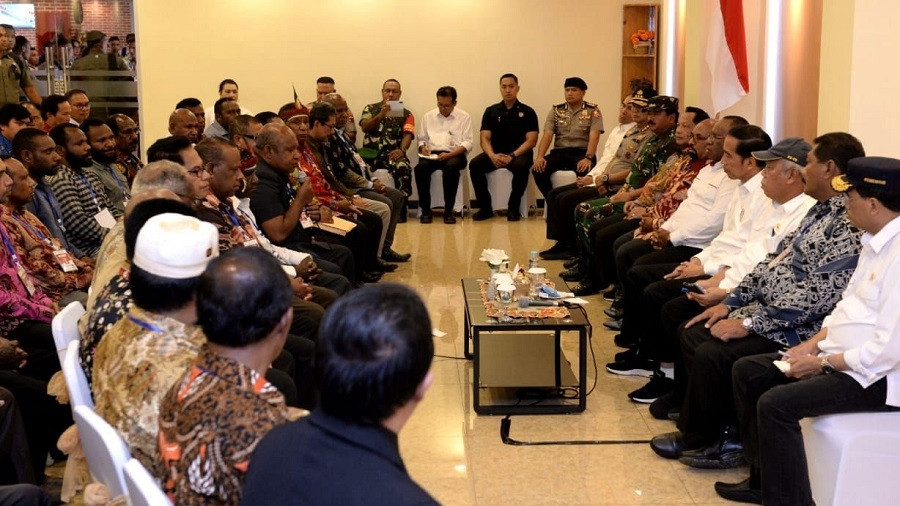Popular Reads
Top Results
Can't find what you're looking for?
View all search resultsPopular Reads
Top Results
Can't find what you're looking for?
View all search resultsCarmel Budiardjo: She will never die!
Carmel did not hesitate to criticize the British government for selling arms to the Indonesian Military (TNI), which had been brutally persecuting Papuan activists
Change text size
Gift Premium Articles
to Anyone
P
erhaps it was about five years ago, I cannot remember. What I still remember clearly is her powerful and determined voice: “Please do not forget the West Papuans, before it is too late.”
At over 90 years old, Carmel Budiardjo’s health had deteriorated. She had been using walking aids and had limited mobility. Of course, this is common and to be expected of most people at that age.
However, her spirit remained different. Not many people over 90 could be actively involved in human rights campaigns in regions far away from home.
But Carmel, who was born as Carmel Brickman in 1925 to a Jewish family in East London – the very area where I live now – was not always interested in Indonesia and its surrounding countries. As a child, she even took part in celebrating Empire Day at school and was not aware that the day commemorated British colonialism in many other regions. To most of these colonized peoples, the British Empire meant poverty and suffering and was definitely not to be celebrated.
It was her encounter with people from various countries when she was a student at the London School of Economics (LSE) that made her aware of the plights of other countries, especially of colonized ones. Her Jewish background and experience of anti-Semitism had made her sensitive to the oppressed and victims of injustice and racism.
The growth of this awareness prompted Carmel to join the International Union of Students (IUS) – an organization that promoted global equality – which gave her an opportunity to meet people from and in different parts of the world.
It was also through her activism in the IUS that she met Budiardjo in Prague in 1948, while he was studying political science at Charles University. They got married in 1950. This was a rather brave decision by both, as Carmel had a Jewish background and Budiardjo a Muslim one. Yet Carmel made another brave decision, which was very unusual for women in her era: moving to Indonesia to follow her husband.
Carmel had to adapt to new cultures, people and a new climate, and she learned another language. In the new country, she continued her work fighting inequality and got a job as a researcher in international economic relations for the Indonesian Foreign Ministry.
The couple had two children, Tari and Anto, who witnessed the political activism of their parents. In her memoir Surviving Indonesia’s Gulag (1996), Carmel wrote, “During the time I had lived in Indonesia, I had identified closely with Indonesian society and never lived as an expatriate.”
However, her adopted home turned out to be a place of hell for her and her family not long after the murder of six generals and one aide on Oct. 1, 1965.
Budiardjo was imprisoned for 12 years for his involvement with the Indonesian Communist Party (PKI). Although Carmel was never a member of the PKI, she was also imprisoned in 1968. Carmel’s family in the UK contacted the British government to lobby for Carmel’s release, but it was not particularly sympathetic because Carmel had renounced her British citizenship.
Carmel had also supported the Indonesian government when a disagreement occurred between it and the British government over the Indonesia-Malaysia confrontation.
Luckily, Amnesty International gave their support for Carmel’s release, and because of this, London was persuaded to declare Carmel Budiardjo’s British citizenship renunciation invalid. This made the New Order authority uneasy and led to her release.
Carmel, however, felt rather uncomfortable about this “special” treatment. However, her fellow prisoners encouraged her to take the opportunity. “Get out of here as fast as you can,” they said, “and start working for our release.”
Upon her return to London, Carmel founded the NGO TAPOL with Liem Soei Liong and campaigned for the release of political prisoners in Indonesia. With limited funding, she decided to make her home in Surrey, South London, its headquarters. Once, I visited their very simple office, before TAPOL moved its offices to another part of London.
However, the persistent voice of TAPOL in challenging human rights abuses made Ali Alatas, a former Indonesian foreign minister, once falsely allege that TAPOL was a foreign organization with a huge amount of funding trying to undermine the authority of the Indonesian government.
TAPOL later also campaigned to spread awareness about human rights abuses in East Timor and Papua. Carmel did not hesitate to criticize the British government for selling arms to the Indonesian Military (TNI), which had been brutally persecuting Papuan activists. This was because, for Carmel, loyalty was not due to any one nation or country but to human beings and humanity – a fearless spirit that is still much needed in this world and will echo for generations to come.
Carmel passed away on Saturday. However, her legacy will remain powerful, energetic and alive. She will never die.
***
The writer is a lecturer in the Department of Languages, Cultures and Linguistics at SOAS University of London, and the author of The End of Silence: Accounts of the 1965 Genocide in Indonesia (Amsterdam University Press, 2017).










